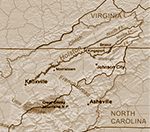from Carter County, Tennessee and Its People
Godfrey Carriger (German spelling: Godfried
Kercher) was born March 7, 1732 and died
October 8, 1811. He was a Revolutionary War
soldier who came to the Watauga Settlement in
1782 from Brunswick County, PA.
His wife was
Margaret Hanspaugh.
Carriger was on one of the
wealthiest men in the area. He brought from
Pennsylvania six wagon loads of supplies
which included fine furniture, an iron cook
stove, the first in the territory, over $35,000
dollars in gold, and a number of slaves. The
1792 tax roll shows Carriger owning nearly
3,000 acres of land, which reached from the
mouth of Stoney Creek to Winner Community
During the 1790s Carriger prepared the
roll for his community and returned it to the
office in Jonesborough. He was overseer of the
wagon road from Sycamore Shoals, through his
property to the foot of the Holston Mountain
Godfrey and his sons appear to have been
experienced iron workers, and they were
instrumental in developing this industry on
Stoney Creek which continued until 1891.
The
Carrigers were also involved in county and
state politics.
A Tennessee historical marker in the Hunter
Community is a reminder of this industrious
German family. On the Carriger property where
Stoney Creek empties into Watauga River, was
a loading ramp known as Carriger's Landing
During times of high water Gunnel boats were
loaded with iron bars, grain, ginseng roots and
cured pork packed in barrels for shipment to
towns downstream.
Carriger's Landing
Here, where Stony Creek empties
into Watauga River, corn, wheat,
wrought iron etc., were loaded on
flat boats for shipment in the
late 1700's and early 1800's.
Western emigrants also embarked
here. The brick house nearby was
built by Christian Carriger, son of
the original settler; Godfrey Sr.
(Historic Marker at Carriger's Landing, Hunter Community)
The Bible record of the Carriger family was
entered in German. It was translated in 1845
and showed the following eight children:
1. Nicholas Carriger (b 28 Feb., 1761).
Records show that he served jury duty, made
bond for the sheriff in 1797 and owned 450
acres in 1796.
2. Michael Carriger (27 April, 1764-d. 1809).
The tax roll of 1796 shows him on 750 acres in
Watauga Valley. One of his daughters [Nancy Ann] was
married to Caleb Cox.
3. Leonard Carriger (b. 3 Jan., 1766).
4. Godfrey Carriger, Jr. (b. 13 May, 1769-
1827). He was Register of Deeds (1796-1827);
served as Constable; was a Major in the
Revolutionary War. He donated land for the first
school at Hunter in 1800 where he owned 320
acres including the Carriger homeplace. He
married Elizabeth Lovelace Crawley, widow of
William Crawley. Two sons were born to this
union, Jackson D. Carriger and Allen T.
Carriger, both of whom were Unionists during
the Civil War.
5. Elizabeth Carriger (b. 14 Feb., 1771).
1797 she married John Nave...
6. Henry Carriger (b. 26 Feb., 1774).
7.
John Carriger (b. 14 Feb., 1777).
8. Christian Carriger (b. 28 July 1779).
Christian was a Colonel in the War of 1812,
where he served under John Fremont. He built
the first brick house in Carter County in the
Hunter Community and server two terms in the
Tennessee General Assembly. In 1846 he
moved to Missouri for a while and then set out
for California, but died enroute and was buried
in the Rocky Mountains.


